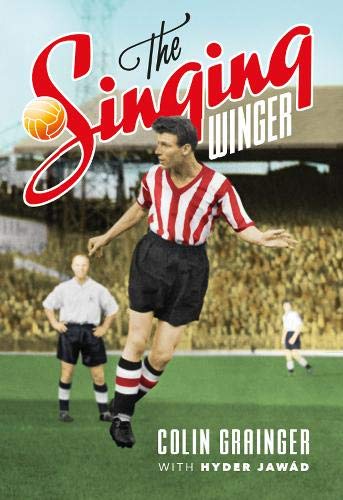Book Review: The Singing Winger by Colin Grainger and Hyder Jawad

In 1950 the United Kingdom had George VI on the throne, with Labour under Clement Atlee in power after winning a second term in February of that year. In the world of football in England, Portsmouth took the First Division title, Tottenham earned promotion to the top flight after winning the Second Division, whilst Arsenal won the FA Cup beating Liverpool 2-0 at Wembley. On the international front England slipped to a shock 1-0 defeat against the USA at the World Cup in Brazil. Later that year in October, a seventeen year old lad from Yorkshire called Colin Grainger, pulled on his boots to make his Football League debut for Wrexham in the Third Division North.
Now it is not a name that will be familiar to many, but during his career, Grainger became a household name in not just one field, but two. In terms of his football exploits, the winger/outside left, came to play seven internationals for England, scoring two goals on his debut against Brazil at Wembley and as a singer he toured the country up until 1970, even releasing a record in 1958 and appearing on the bill with The Beatles. This dual success lead to his show billing as The Singing Winger – and taken as the title of this interesting book.
Grainger with journalist Hyder Jawad detail life on the pitch and on stage in chronological chapters (from 1933 to the present), with a brief introduction (Exordium) in which Grainger pays tribute to his parents and his family. The debt of gratitude that Grainger feels to his mother and father is evident throughout the book, typified by the recurring phrase, “Son, no way you’re ever going a pit.” Football was in the Grainger genes, with brother Jack, having a career at Rotherham United, Lincoln City and Burton Albion, and cousins Jack and Dennis Grainger and Edwin Holliday all playing professional football.
Given that Grainger is looking back on his life, is it no surprise that this is a very reflective book. The world described is a very different one not only on the pitch but in the wider context of everyday life in Britain. In terms of the football story, the reader is taken to the highs of his career as an England International, where all his seven caps were earned in an eleven month period, through his journey and lows of injury that saw his play in all four divisions of the professional game with, Wrexham, Sheffield United, Sunderland, Leeds United, Port Vale and Doncaster Rovers. Grainger continued his career in non-league allowing him a quite unique record of playing in the FA Cup, League Cup, FA Trophy and FA Vase.
Within his football career there are some interesting insights, with Grainger quite open about the illegal signing-on fees prevalent at the time, an honesty about the managers and players from his era and some observations of Brian Clough and Peter Taylor, long before their management success with Derby County and Nottingham Forest.
If there is a criticism of the book, is it that as a reader an expansion and further exploration of some of the footballing tales and indeed Grainger’s time on stage in the music business, would have added to the enjoyment. However, essentially this is an intriguing look at a unique career that simply wouldn’t be possible in the modern era.